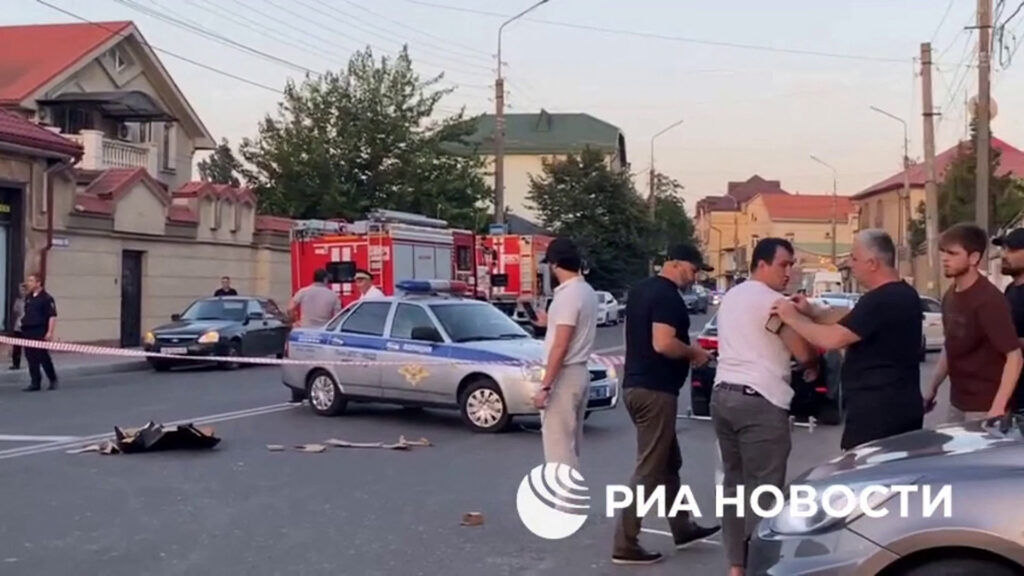
This screengrab picture taken from video released on June 23, 2024 by Russian state news agency RIA Novosti shows an area sealed off by Police following deadly attacks on churches and a synagogue in Russia’s North Caucasus region of Dagestan. | AFP PHOTO/RIA NOVOSTI
Gunmen attacked churches and synagogues in Russia’s North Caucasus region of Dagestan on Sunday, killing at least eight police and national guard officers and a priest, officials said.
The unidentified gunmen launched simultaneous attacks in Dagestan’s largest city of Makhachkala and in the coastal city of Derbent.
READ MORE:
Putin offers truce if Ukraine quits Russian-claimed areas, NATO bid
West Bank raid: Israeli forces tie wounded Palestinian to jeep
Russia’s Investigative Committee said it had opened criminal probes over “acts of terror” in Dagestan, a largely Muslim region of Russia neighbouring Chechnya.
Russian officials said police had killed four gunmen in Makhachkala and two in Derbent.
“This evening in the cities of Derbent and Makhachkala armed attacks were carried out on two Orthodox churches, a synagogue and a police checkpoint,” the National Anti-terrorism Committee said in a statement to RIA Novosti news agency.
“As a result of the terrorist attacks, according to preliminary information, a priest from the Russian Orthodox Church and police officers were killed.”
The committee later said the “active” phase of the operation against attackers in Derbent had ended.
In all, six officers were killed and 12 wounded in the attacks, the spokeswoman for Dagestan’s interior ministry, Gayana Gariyeva, told RIA Novosti.
The ministry later added that a local police chief had died from his wounds.
Russia’s National Guard meanwhile said one of its officers had been killed in Derbent and several others wounded.
In a separate attack, the Dagestan interior ministry said that in a village 65 kilometres (40 miles) from Makhachkala, called Sergokal, gunmen had shot at a police car, wounding one officer.
A law enforcement source said Sergokal district chief was being questioned over his sons’ possible involvement in the attacks, RIA Novosti reported.
The Russian Orthodox Church said its archpriest Nikolai Kotelnikov was “brutally killed” in Derbent.
Synagogues on fire
Sunday is a religious holiday, Pentecost Sunday, in the Russian Orthodox Church.
Dagestan’s interior ministry said 19 people took shelter inside a church in Makhachkala and were later led out to safety.
Gunmen also attacked synagogues in both cities.
“The synagogue in Derbent is on fire,” the chairman of the public council of Russia’s Federation of Jewish Communities, Boruch Gorin, wrote on Telegram.
“The synagogue in Makhachkala has also been set on fire and burnt down,” he said.
The rabbi of Makhachkala, Rami Davidov, later told RIA Novosti that no one was killed or injured there.
The Russian Jewish Congress said on its website the Derbent synagogue was attacked about 40 minutes before evening prayers.
Gunmen fired at police and security guards and threw in Molotov cocktails, it said, adding that the attack in Makhachkala was similar.
The leader of Dagestan, Sergei Melikov, wrote on Telegram: “This evening in Derbent and Makhachkala unknown (attackers) made attempts to destabilise the situation in society.”
State news agency TASS cited a law enforcement source as saying the “gunmen who carried out attacks in Makhachkala and Derbent are supporters of an international terrorist organisation”, without naming it.
Russia’s FSB security service in April said it had arrested four people in Dagestan on suspicion of plotting the deadly attack on Moscow’s Crocus City Hall concert venue in March, which was claimed by the Islamic State group.
Militants from Dagestan are known to have travelled to join IS in Syria, and in 2015, the group declared it had established a “franchise” in the North Caucasus.
Dagestan lies east of Chechnya, where Russian authorities battled separatists in two brutal wars, first in 1994-1996 and then in 1999-2000.
Since the defeat of Chechen insurgents, Russian authorities have been locked in a simmering conflict with Islamist militants from across the North Caucasus that has killed scores of civilians and police.
Read Next
Disclaimer: The comments uploaded on this site do not necessarily represent or reflect the views of management and owner of Cebudailynews. We reserve the right to exclude comments that we deem to be inconsistent with our editorial standards.

